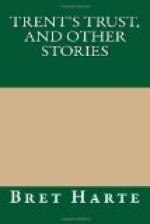He made his way to the nearest thicket, where he rightly believed the ambush had been prepared, and to which undoubtedly they first retreated with their booty. He expected to find some signs or traces of their spoil which in their haste they had to abandon. He was more successful than he anticipated. A few steps into the thicket brought him full upon a realization of more than his worst convictions—the dead body of Foster! Near it lay the body of the mail agent. Both had been evidently dragged into the thicket from where they fell, scalped and half stripped. There was no evidence of any later struggle; they must have been dead when they were brought there.
Boyle was neither a hard-hearted nor an unduly sensitive man. His vocation had brought him peril enough by land and water; he had often rendered valuable assistance to others, his sympathy never confusing his directness and common sense. He was sorry for these two men, and would have fought to save them. But he had no imaginative ideas of death. And his keen perception of the truth was consequently sensitively alive only to that grotesqueness of aspect which too often the hapless victims of violence are apt to assume. He saw no agony in the vacant eyes of the two men lying on their backs in apparently the complacent abandonment of drunkenness, which was further simulated by their tumbled and disordered hair matted by coagulated blood, which, however, had lost its sanguine color. He thought only of the unsuspecting girl sitting in the lonely coach, and hurriedly dragged them further into the bushes. In doing this he discovered a loaded revolver and a flask of spirits which had been lying under them, and promptly secured them. A few paces away lay the coveted trunks of arms and ammunition, their lids wrenched off and their contents gone. He noticed with a grim smile that his own trunks of samples had shared a like fate, but was delighted to find that while the brighter trifles had attracted the Indians’ childish cupidity they had overlooked a heavy black merino shawl of a cheap but serviceable quality. It would help to protect Miss Cantire from the evening wind, which was already rising over the chill and stark plain. It also occurred to him that she would need water after her parched journey, and he resolved to look for a spring, being rewarded at last by a trickling rill near the ambush camp. But he had no utensil except the spirit flask, which he finally emptied of its contents and replaced with the pure water—a heroic sacrifice to a traveler who knew the comfort of a stimulant. He retraced his steps, and was just emerging from the thicket when his quick eye caught sight of a moving shadow before him close to the ground, which set the hot blood coursing through his veins.




